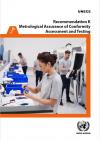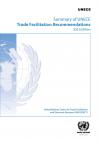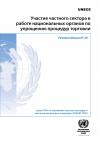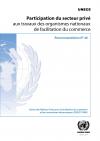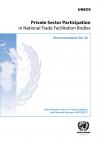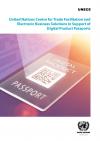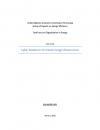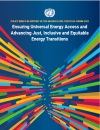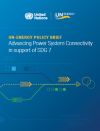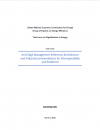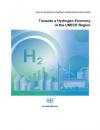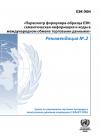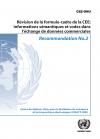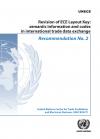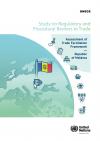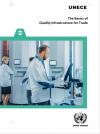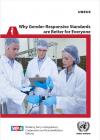Publications
Displaying Results 1 - 20 of 418
- English
La métrologie garantit l’uniformité des mesures et leur traçabilité dans le Système international d’unités (SI). Elle permet aux fabricants de créer des produits de meilleure qualité, de manière plus précise et plus rapide. Pierre angulaire de la normalisation internationale et de l’infrastructure qualité en général, elle contribue à faciliter les échanges commerciaux. La présente recommandation
- English
Метрология обеспечивает единство измерений и их метрологическую прослеживаемость к единицам Международной системе единиц (СИ). Это позволяет производителям выпускать продукцию с большей точностью, быстрее и более высокого качества. Метрология является краеугольным камнем международной стандартизации и инфраструктуры обеспечения качества в целом, что содействует упрощению торговли. Данная
- English
Metrology ensures the uniformity of measurements and
their metrological traceability to the International System
of Units (SI). It allows manufacturers to produce products
more accurately, more quickly and to a higher standard.
It is the key cornerstone to international standardization
and the quality infrastructure in general, which contributes
to the facilitation of trade.
This recommendation
- English
This publication (ECE/TRADE/475) provides the following information on each recommendation:
Brief description
Equivalent ISO standard number (where appropriate)
Current status, indicating whether the recommendation is under development, approved or under revision
Dates and publication numbers of documents containing the first approved and last revised versions of the recommendation
Indication and
- Pусский
Цель данной рекомендации состоит в том, чтобы довести до сведения правительств, насколько важным является активное участие частного сектора в работе национальных органов по упрощению процедур торговли (НОУТ) в целях повышения их значимости, легитимности и эффективности. В Рекомендации Европейской экономической комиссии Организации Объединенных Наций (ЕЭК) № 4, первоначально утвержденной в 1975
- Français
L’objet de la présente recommandation est de sensibiliser les pouvoirs publics à la nécessité de faire participer activement le secteur privé aux travaux des organismes nationaux de facilitation du commerce (ONFC) afin de rendre ces derniers plus pertinents, plus légitimes et plus performants. Dans la Recommandation no 4 de la Commission économique pour l’Europe (CEE), initialement approuvée en
- English
The purpose of this recommendation 48 (ECE/TRADE/479) is to communicate to governments how important the active engagement of the private sector is in national trade facilitation bodies (NTFBs) for strengthening their relevance, legitimacy and performance. The United Nations Economic Commission for Europe (ECE) Recommendation No. 4, originally approved in 1975 and revised in 2015, stressed that
- English
Digital tools can play an important role in accelerating the shift to a circular economy. Digital tools can increase transparency along value chains and provide information, which in turn can help to extend the lifecycle of products.
Digital Product Passports (DPPs), for example, can inform consumers and businesses about products, materials, the conditions under which they are produced and their
- English
Digitalization is gaining more and more attention as a way to support and complement the energy transition process. Digitalization entails the use of digital technologies for existing processes, as it helps address existing challenges in new ways.
While using an integrated energy system with intelligent connected devices has many advantages, it also causes challenges. One of these challenges is
- English
The sixth compilation of the SDG 7 Policy Briefs, titled "Ensuring Universal Energy Access and Advancing Just, Inclusive and Equitable Energy Transitions," prepared by the SDG 7 Technical Advisory Group (SDG7 TAG), in support of the review of the SDGs at the United Nations High-Level Political Forum 2023.
- English
This UN-Energy Policy Brief was prepared in support of the SDG7 review at the High-level Political Forum 2023 in line with the UN-Energy Plan of Action Towards 2025. The Plan outlines UN-Energy’s contributions towards the implementation of the Global Action Plan for Accelerated SDG 7 Action presented by the UN Secretary-General as an outcome of the UN High-level Dialogue on Energy in 2021. The
- English
This case study addresses the challenge of distributed energy resources integration to support grid resilience, identifying key infrastructure requirements, assessing policy developments and deriving recommendations. The underlying premise of this case study asserts that whilst the energy sector is making advances towards decarbonization, decentralization and digitalization, the increasing share
- English
Hydrogen is an energy carrier that can decarbonize economies and promote sustainable economic growth and system resilience. Although many low-emission hydrogen projects have been announced over the past two years, a mere 4% of them have reached a final investment decision. This indicates that achieving the scale and pace of hydrogen deployment requires more decisive actions from policymakers and
- Pусский
Рекомендация № 2 Европейской экономической комиссии (ЕЭК) Организации Объединенных Наций была первоначально утверждена одновременно с Рекомендацией № 1 ЕЭК «Формуляр-образец Организации Объединенных Наций для внешнеторговых документов», чтобы подчеркнуть важность четкого определения используемой в документах информации и рекомендовать применение перечней кодов, когда это возможно. Позднее она
- Français
La Recommandation no 2 de la Commission économique pour l’Europe (CEE) a été initialement approuvée en même temps que la Recommandation no 1 intitulée « Formule-cadre des Nations Unies pour les documents commerciaux » afin de souligner qu’il importait d’arrêter une définition univoque des informations figurant dans les documents et de recommander l’utilisation de listes de codes dans la mesure du
- English
United Nations Economic Commission for Europe (ECE) Recommendation No. 2 was originally approved at the same time as ECE Recommendation No. 1: United Nations Layout Key for Trade Documents to underline the importance of unambiguous definition of the information in documents and to recommend the use of code lists to the extent possible. It was later integrated into the United Nations Layout Key
- English
This study (ECE/TRADE/477) provides information regarding the current state of play of the trade facilitation framework and the remaining outstanding Category C commitments, including the current standing with respect to the implementation status of specific measures, further capacity needs, and recommendations for the way forward. It also specifies which recommendations refer to mandatory
- English
Quality infrastructure is the unsung hero of trade; it is essential for market access whilst promoting essential regulatory objectives such as safety, quality and sustainability in industrial goods. But it is not well known by the general public. This publication provides a baseline understanding of the different elements of quality infrastructure and some insight as to how this affects trade
- English
This policy paper explores the various intuitional arrangements for transitions to a circular economy in UNECE region and shapes out policy options for successful transition and establishment of sustainable connections among stakeholders.
- English
The short publication Why Gender-Responsive Standards are Better for Everyone offers an explanation and rationale of gender-responsive standards for the new comer. It provides a general overview of the intrinsic nature of standards and how these might affect women and men differently.
The publication underlines that gender-responsive standards improve the desired outcome. Standards seek by nature


